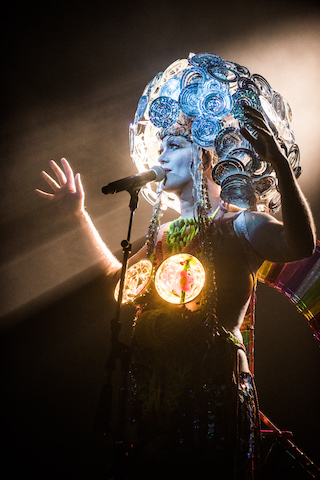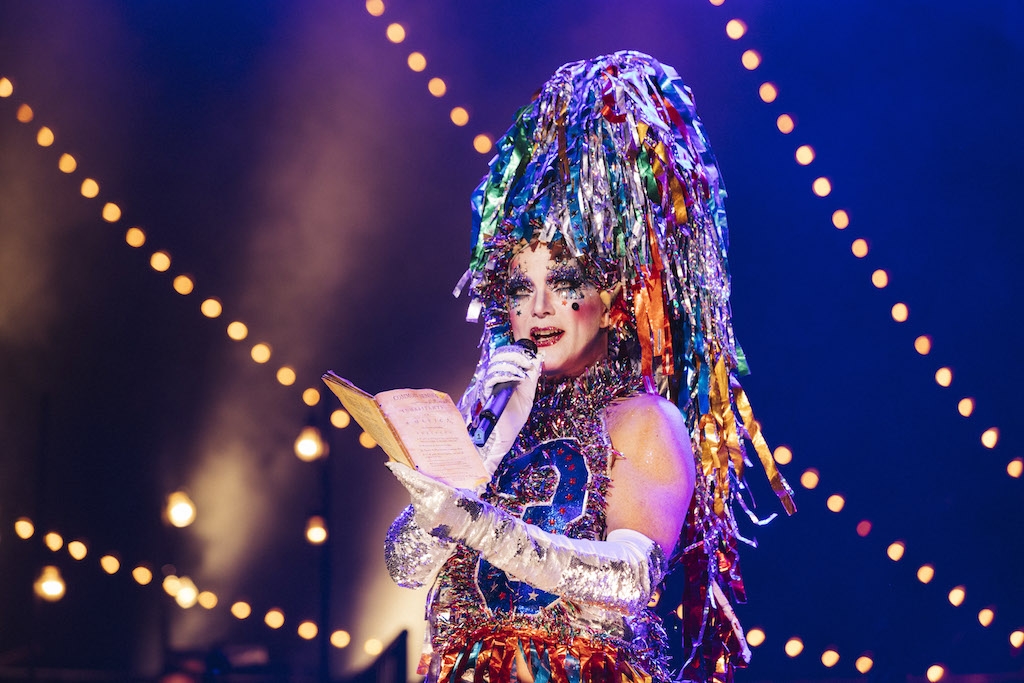Here’s the concept: to offer an alternative history of the United States through 246 popular songs from the Declaration of Independence to today. A song for each year plus a few more, performed over the course of four six-hour-long stage shows at the Berliner Festspiele. Add to this more than 100 performers, musicians and dancers, and a fully realised stage musical that involves maximum audience participation, and you have some idea of the challenge that Taylor Mac undertook in writing, producing and performing the 24-Decade History of Popular Music. It was for ‘fearlessly experimental works’ of theatre such as these that judy was awarded a MacArthur Genius Grant in 2017 (oh yes, Mac’s preferred gender pronoun is judy with a lower-case j).
I attended the second night in October, having some knowledge of Mac’s style from judy’s performance The Be(A)st of Taylor Mac at the Edinburgh Fringe in 2006, which made such an impact on me that I went twice, and then a third time when it came to Dublin. On a tiny stage, dressed in a riot of glitter and feathers, judy sang then to a small audience about politics, sex and intimacy. One song, The Palace of the End, imagined an encounter between Lynne Cheney and Saddam Hussein (both of whom wrote romance novels, albeit in very different registers). The show at the Festspiele was performed to over 500 people, with a live band and a wardrobe of costumes provided by Mac’s long-time sartorial collaborator Machine Dazzle, but Mac’s performance had lost none of the intimacy, openness and honesty that endeared judy to me over a decade before.

American songbook standards and spirituals transported us through the Civil War and the abolition of slavery. We were handed ping-pong balls by the ‘dandy minions’, a ragtag bunch of performers from every conceivable point on the gender spectrum whose job it was to go among the audience and rally participants. To convey conflict and division, we were then called upon to throw the ping-pong balls at each other in a pantomime of fury. My only regret about the night was that, at one point, hunger got the better of me and I slipped out of the theatre. When I returned the stage was lit in neon and a wedding seemed to be taking place between a performer in an alien costume and an audience member. The loose grasp I had on proceedings was lost at this point. But there followed a group singalong of Gilbert and Sullivan’s Willow, tit-willow from The Mikado (1885) in which we were asked to repeat the refrain so many times that the already sinister tune drove us into a collective delirium.
The last song judy performed was Charles K. Harris’ 1891 Tin Pan Alley waltz After the ball, with added commentary to elucidate the subtext of the lyrics. In the world of Taylor Mac even the most seemingly innocent of lines are up for reappraisal: ‘A little maiden climbed an old man’s knee / Begged for a story, “Do, uncle, please!” / Why are you single? Why live alone? / Have you no babies? Have you no home?’ The uncle is – in judy’s reading – clearly gay and living a lie. Mac delivers the song with tongue planted firmly in cheek, bringing to light experiences that the old versions gloss over. At a time when minorities in the US are being even further marginalised and history is being rewritten to diminish their visibility and rights, the old renditions will no longer do. We need to look at life and art from different perspectives and the perspective judy offers is one of warmth and acceptance and inclusivity.

The difference, in fact, most difficult to overcome was not one of gender or sexuality but culture. Because the show was so long, people came and went as they pleased and were mostly able to sit wherever they wanted. For some Berliners, however, the idea of having bought a ticket for seat 5, row J and then not actually sitting in it was enough to short-circuit their brains. Arguments broke out among audience members about the sheer horror of not being able to sit in their allocated seat. Mac was quick to intervene. ‘Just sit anywhere!’ judy shouted from the stage and, as an aside, ‘They warned me this would be a problem in Germany.’
In December 2019 Taylor Mac was announced as the first artist-in-residence for WNET’s All Arts, a streaming platform to showcase artists working across various disciplines
